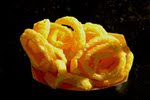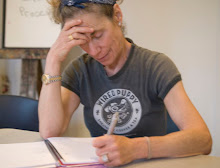My friend Jessica Harris, who writes terrific books about Caribbean and African cuisine, was visiting one April during Passover when the phone rang and the familiar voice warbled, “Lora, Julia Child, here. Bring Jessica to lunch tomorrow, we’ll have leftovers.”
Getting a call from Julia Child was, on almost every level, an out-of-body experience. No matter how many times I talked to her on the phone, I never lost the thrill of hearing that distinctive voice coming, not over the television, but over my telephone. I never got over the astonishment of her calling me. No matter whom she called, when she was finished with what she had to say, she simply hung up with out a goodbye, leaving the person on the other end holding the dead receiver, wondering it the conversation did, indeed, take place.
Julia’s strongly held views and idiosyncrasies were legendary. In addition to good food, she loved a good time, an off-color joke and the company of people who loved the same. She was not above laughing at herself. The first time I went to dinner at her house, we were joined by, among others, baking icon Maida Heatter and Maida’s husband Ralph. Ralph asked Julia how she felt about her recent portrayal on Saturday Night Live where Dan Ackroyd first uttered those now-famous lines. “Save the liver!” Someone at the table said that they hadn’t seen it. In response Julia jumped up and herded us into the small pantry at one end of the kitchen. There, in addition to assorted food stuffs and a microwave oven, was a small television with a Betamax. Julia popped in a tape, pressed the remote and we stood around watching as ‘the French Chef’ chopped off her thumb. No one laughed as hard as Julia who, in fact, had us watch it several more times.
Julia never minced words and certainly never sugarcoated anything. When I was in the hospital recovering from a mastectomy she called to ask how I was doing. She said that when in her fifties she’d been diagnosed with breast cancer she’d made the same choice of treatment. “I told them to just lop it off, and never thought about it again.”
On the subject of religion, Julia took no prisoners. Just before she moved from Cambridge to Santa Barbara we invited her for dinner. Although plagued with hip and knee problems and near-crippling osteoporosis, her wit and opinions were however, as sharp as a newly honed chef’s knife. We were discussing real estate. Julia’s friend and indispensable assistant, Stephanie Hirsch, who was in the process of buying a house, mentioned that the real estate agent for the seller was clearly anti-Semitic, forcing Stephanie, at least until the deal was closed, to pretend that Hirsch was not a Jewish name.
“Well, I for one find it hard to believe that sort of thing still goes on in Boston,” said Julia with astonishment.
Only a WASP could think that, was my reaction.
“Give me a break,” I said, rather hotly. “It wasn’t so long ago that another kid called my son a kike in the playground.”
“Well,” said Julia, fairly pounding the table at this point, “if you want to know the biggest kike of all, it was Jesus Christ himself!”
She had no patience for food fads or people on weird diets, dismissing health food nuts with the same distain as she did food snobs. I think it was the unfortunate combination of contempt for religion and what she regarded as a ‘weird’ diet that got me into trouble that day we went to lunch.
Jessica and arrived at 103 Irving Street in Cambridge, Massachusetts at the appointed hour. Julia’s kitchen (which is now preserved at the Smithsonian) was special in so many ways. It was more than the furnishings; the long, sturdy wooden table that could seat a crowd, the peg board that Julia’s husband Paul had hung to hold her pots and pans, the well loved and equally well used restaurant stove, Paul’s sunny oil paintings of Provence hung on the walls, The energy, genuine interest in others and down-to-earth hospitality that Julia showed her guests made each visit stand out in memory. The safe bet that she’d say or do something outrageous, thus adding to one’s collection of “Julia stories’ was equally appetizing.
Julia slapped her trademark bowl of Goldfish down on the table and poured us some good white wine. She directed Jessica to make a salad while she whipped up vinaigrette.
I regarded the Goldfish. Definitely on the ‘Not Allowed’ list of Passover foods. This list, depending on your level or observation and whether you are an Ashkenazi (Eastern European) or Sephardic (from the Mediterranean area) Jew, may or may not include rice and grains. No matter where your relatives hailed from, at the top of the NO list is food that contains flour and leavening. For the eight days of Passover, the holiday that commemorates the exodus of the Jews from Egypt, bread in any form, with the exception of matzoh, the unleavened bread made specifically for the holiday, is verboten. While my family wasn’t the most observant in the world (I didn’t change my dishes or empty my pantry as many orthodox and conservative Jews do), we did celebrate Passover by holding a Seder and giving up chametz (forbidden foods) for the duration. This was, upon reflection, entirely due to my grandmother, who did keep a strictly kosher house, and assured all her progeny that a transgression of any sort would land us in hell for sure. In adulthood I succumbed to the seduction of lobster and other shellfish, and developed a passion of bacon as well, but I kept Passover in my fashion until the day I faced off with the indomitable Julia Child.
No Goldfish for me.
“We have this lovely turkey roulade that Jacques and I made for yesterday’s taping.” Ah, lunch by Julia and Jacques Pepin. It couldn’t get much better than that.
“Stuffed with wild rice and pecans,” she elaborated.
I could pick out the rice, I rationalized.
“Lora, slice up this baguette, the baker dropped it off this morning.“ Julia commanded handing me a serrated knife and a blue-ribbon loaf. I sliced as instructed. We sat down to eat.
Julia quizzed Jessica about her latest book, her travels, her up and coming projects. I tried as unobtrusively as possible to separate the rice from the turkey on my plate. The trouble was there was no place to hid the pile I created. I could take piece of bread and cover the pile, but that would leave two uneaten things on my plate.
Julia turned her attention to me, “What are you doing to that food?” she demanded, looking at my plate. A fussy five-year-old might have been eating from it. Clearly I wasn’t unobtrusive enough.
“Well,” I began sheepishly, “it’s Passover…”
“And what exactly does that mean?”
“I can’t eat any bread or grains.”
“Don’t be ridiculous! Is this a religious thing?”
“Yes, actually.”
“Hogwash! All that religious hooey. It’s not for thinking people.” She pushed the basket of bread toward me.
I remembered the story about Theodore White and Mao Tse Tung. White, an observant Jew and Time Magazine’s China bureau chef in the 1940's, was invited to a formal banquet. As the honored guest he was seated next to the Chairman himself. As is the custom, elaborate course after course appeared and was enthusiastically consumed by the appreciative guests, under the watchful eye of their host. Then the main course arrived in all its glory and with an apple stuck into its mouth. An enormous lacquered roast pig was born to the table and placed stage center directly in front of the guest of honor. Eating bread on Passover constitutes one level of disobedience, but eating pork anytime is simply not an option for someone who keeps kosher. White knew that to refuse such a delicacy from Mao would cause the Chairman to lose face in front of the other guests, and reflect poorly not only on White’s bad manners, but on the entire United States as well. It would be a diplomatic gaff of the worst kind.
Mao indicated that as guest of honor, White should partake first. The hesitant diner tried to quietly explain that Jews like himself, who kept kosher were forbidden from eating pork. Mao digested this for a moment and then said,
“Teddy, this may look like pig, but it’s actually duck. So there’s no problem for you to eat it.” White did as he was told.
Julia held the basket of bread out to me. She wasn’t going to put it down until I took a piece and ate it. I wouldn’t have done it for Mao Tse Tung, but I did it for Julia, and as I did I rationalized my transgression by considering (if I didn’t go to hell first) what a good story it would make.
© 2009



6 comments:
Lora, Thanks for sharing. I'm so happy that your writing on air. Debbie and I have a few Julia stories of our own that we've kept tucked away like precious gems from a dear, departed loved one. We visited with her in Santa Barbara days before her last birthday, when she entertained us in that grand style that made her an American icon, and then, after her death, we visited with her kitchen in DC.
Absolutely brilliant! I loved every word.
Can't wait til we have our Julia evening at La Combe.
Barbara
Thanks, Lora. I could hear you talking as I read your account. I still need to see the movie. I do enjoy your writing style. Keep it up! Bob Brown (Dayton, Ohio)
Fantastic, Lora,
So good to hear your voice through your wonderful writing. I am looking forward to reading more (and yes, Random House is definitely missing out!). I am sending the Chocolate cookbook to Madrid tomorrow with a friend. Another city you will have conquered!xoxo Susan
Good for you, getting your stuff out where everyone can see it again! Cookbooks are dead - long live the Web! (Sorry, I know authors everywhere will hate me for that...)
Lora, I loved this, too!
Post a Comment